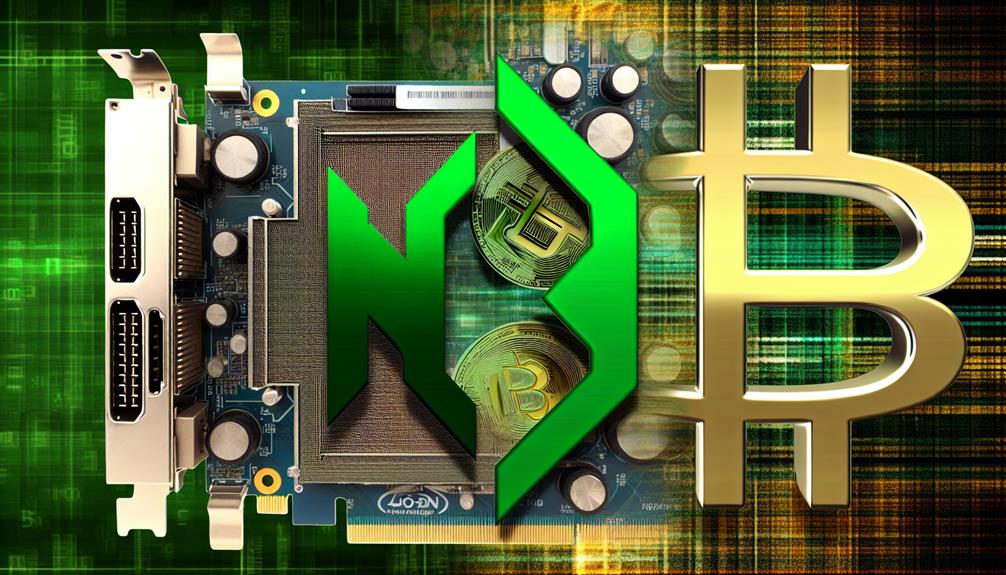It's often said that Nvidia has a unique relationship with the world of cryptocurrency, but does that mean it owns Bitcoin? While the company excels in producing GPUs that fuel the mining of various cryptocurrencies, including Bitcoin, its true focus lies elsewhere. Understanding Nvidia's strategic approach reveals much about the interplay between hardware and digital currencies. However, the nuances of Nvidia's involvement in the crypto space raise questions about its future direction and market impact that are worth exploring further.
Nvidia's Business Model

Nvidia's business model primarily revolves around designing and manufacturing graphics processing units (GPUs) that cater to a variety of markets, including gaming, professional visualization, data centers, and artificial intelligence. The company has established a strong foothold in the gaming industry, where its GPUs are widely recognized for delivering high performance, enabling immersive experiences, and supporting advanced graphics technologies.
To enhance its market presence and drive innovation, Nvidia actively engages in strategic partnerships. Collaborations with major gaming developers and platforms, such as Microsoft and Activision Blizzard, allow Nvidia to optimize its GPU technology for specific gaming titles, ensuring gamers receive the best possible performance. These partnerships also extend to hardware manufacturers, enabling the seamless integration of Nvidia's GPUs in gaming consoles and PCs.
Moreover, Nvidia's commitment to research and development positions it at the forefront of technological advancements. The company's GeForce NOW cloud gaming service exemplifies this, providing gamers with access to high-quality gaming experiences without the need for expensive hardware. Through these initiatives, Nvidia not only captures revenue from GPU sales but also creates a recurring revenue model, further solidifying its position in the gaming ecosystem.
Nvidia and Cryptocurrency Mining
When it comes to cryptocurrency mining, Nvidia plays a notable role due to its powerful GPUs, which are highly sought after by miners seeking to maximize their computational capabilities. The demand for Nvidia GPUs has surged in response to the increasing crypto demand, driven largely by the rising value of cryptocurrencies. This trend noticeably impacts mining efficiency, as miners aim to achieve higher hashrates for better returns.
The relationship between Nvidia and the gaming industry also complicates the landscape. As gamers compete for these high-performance GPUs, market trends show a tug-of-war between gaming needs and crypto mining demands. This competition can lead to supply shortages and inflated prices, affecting both sectors.
Moreover, the environmental impact of cryptocurrency mining is a growing concern. High energy consumption associated with mining activities raises serious questions about sustainability. Nvidia has faced scrutiny for contributing to this issue, as the demand for its GPUs escalates with the mining boom.
Additionally, regulation challenges are emerging as governments worldwide consider measures to control the environmental footprint of crypto mining. These regulations could directly affect Nvidia's market strategies and the future of its GPU sales.
Nvidia's Statements on Bitcoin

The tech giant has made various statements regarding Bitcoin, reflecting its nuanced position on the cryptocurrency. Nvidia's policies indicate a cautious approach towards Bitcoin mining, particularly due to environmental concerns and the potential impact on gaming graphics card availability. This has led to a complex relationship with the cryptocurrency community.
Here are some key points from Nvidia's statements:
- Environmental Impact: Nvidia has expressed concerns about the energy consumption associated with Bitcoin mining, prompting discussions about sustainable practices.
- Gaming Focus: The company emphasizes its commitment to gamers, stating that excessive mining can lead to shortages of graphics cards, thereby affecting the gaming community.
- Cryptocurrency Regulation: Nvidia has acknowledged the need for clearer regulations around cryptocurrencies, suggesting that this could help mitigate some of the challenges faced by the industry.
- Product Adaptation: In response to the mining surge, Nvidia introduced specific products tailored for cryptocurrency mining, such as the CMP (Cryptocurrency Mining Processor) series, which aims to balance supply for gamers and miners alike.
Through these statements, it's clear that Nvidia is maneuvering a delicate balance between supporting technological innovation in the cryptocurrency sector and adhering to its core values of sustainability and gamer satisfaction. As Bitcoin mining continues to evolve, Nvidia's policies will likely adapt, reflecting both market demands and regulatory landscapes.
Financial Impact of Bitcoin
Evaluating the financial impact of Bitcoin reveals significant implications for both individual investors and the broader market. Bitcoin volatility is a prominent concern, as its price swings can dramatically affect investment strategies. For you as an investor, understanding these fluctuations is essential in developing a robust portfolio that can withstand market turbulence.
Institutional adoption has been a game-changer, leading to increased legitimacy and liquidity in Bitcoin trading platforms. This shift has encouraged more investors to explore cryptocurrency, driving speculative trends that can create economic implications beyond the digital currency itself. As more institutions enter the market, the need for effective market regulation becomes evident to guarantee stability and protect investors.
Technological advancements also play a critical role in shaping Bitcoin's financial landscape. Innovations such as blockchain technology enhance security and transparency, fostering trust among users and investors alike. As you consider your investment approach, it is important to stay informed about how these advancements can affect Bitcoin's value and its role in your overall strategy.
The combination of Bitcoin's volatility and the evolving regulatory environment means that developing investment strategies tailored to these dynamics is crucial. You'll want to assess not just the potential returns but also the risks involved. This multifaceted analysis will prepare you to navigate the intricacies of Bitcoin's financial impact, ensuring you make informed decisions in an ever-changing market.
Competitors in the Market

In the competitive landscape of cryptocurrency mining, major GPU manufacturers like AMD and Intel are vital players, directly challenging Nvidia's market dominance. Additionally, emerging cryptocurrency platforms are innovating and capturing market share, further complicating Nvidia's position. Understanding these dynamics is essential for evaluating Nvidia's strategies and potential future in the Bitcoin ecosystem.
Major GPU Manufacturers
Competition among major GPU manufacturers considerably shapes the landscape of the graphics processing unit market. As you explore this sector, you'll notice how various players influence trends in gaming performance, AI integration, and mining hardware. This competition is crucial for adapting to changing market demand, especially given the rising interest in blockchain technology and cryptocurrency trends.
Key competitors include:
- Nvidia: Known for high-performance GPUs, often favored in gaming and mining.
- AMD: Offers competitive alternatives, particularly in gaming performance and price.
- Intel: Entering the GPU market with a focus on AI integration and computational tasks.
- Asus: A leading brand in GPU manufacturing, known for innovative designs and cooling solutions.
These manufacturers not only cater to gamers but also target miners looking for peak mining profitability. As cryptocurrency trends fluctuate, the GPU market becomes increasingly relevant, with each company aiming to capitalize on emerging opportunities. The interplay of these competitors guarantees that advancements in mining hardware and performance continually evolve, responding to both consumer preferences and technological advancements.
Emerging Cryptocurrency Players
As the GPU market evolves alongside the increasing demand for cryptocurrency mining, new players are entering the cryptocurrency landscape, each bringing unique offerings and innovations. Companies like AMD and Intel are expanding their focus on emerging technologies, positioning themselves as serious competitors to Nvidia. These firms are developing specialized hardware aimed at optimizing blockchain innovations, catering to miners who require efficient and powerful solutions.
Additionally, decentralized finance (DeFi) platforms and altcoins are rising in prominence, increasing competition for traditional cryptocurrencies like Bitcoin. Projects such as Cardano and Solana are leveraging their unique consensus mechanisms to improve transaction speeds and reduce energy consumption, attracting miners and investors alike. These emerging players are not just challenging the established giants in the cryptocurrency space; they're also redefining the market landscape with their technological advancements.
Future Outlook for Nvidia
Looking ahead, Nvidia's future outlook appears promising, fueled by its strategic positioning in the AI and gaming sectors. With ongoing innovations and a keen awareness of market trends, Nvidia is well-positioned to capitalize on the growing demand for advanced computing solutions. Analysts predict that the company will continue to dominate due to its cutting-edge technologies and diverse applications.
Here's what you should consider about Nvidia's future:
- AI Integration: As businesses increasingly adopt AI technologies, Nvidia's GPUs will be critical for powering these applications, driving demand even higher.
- Gaming Expansion: The gaming industry is rebounding with new titles and platforms. Nvidia's innovations in graphics performance will likely keep it at the forefront of this market.
- Data Center Growth: With the shift towards cloud computing and big data, Nvidia's products are becoming essential for data centers, enhancing its revenue streams.
- Strategic Partnerships: Collaborations with tech giants can further strengthen Nvidia's market share, enabling it to leverage shared resources and expertise.
Frequently Asked Questions
Does Nvidia Mine Bitcoin Directly for Profit?
Nvidia doesn't mine Bitcoin directly for profit; instead, it focuses on producing GPUs for mining. Profit margins depend on market demand and competition, but Nvidia benefits from rising cryptocurrency interest without directly engaging in mining operations.
Can Nvidia's GPUS Be Used for Bitcoin Mining?
You can use Nvidia's GPUs for Bitcoin mining, leveraging their GPU performance and hardware compatibility. However, consider mining efficiency and energy consumption, as these factors greatly impact overall profitability and sustainability in the long run.
What Is Nvidia's Stance on Bitcoin Regulation?
Nvidia's stance on bitcoin regulation reflects a commitment to supporting cryptocurrency policies that guarantee market stability. They advocate for clear regulations, recognizing that effective governance can foster innovation while protecting investors and the industry's integrity.
Does Nvidia Hold Any Bitcoin in Its Reserves?
You might find that Nvidia hasn't publicly disclosed any Bitcoin reserves in its investments. Their focus remains on technology development and gaming hardware rather than holding cryptocurrency, which could influence their financial strategy and market positioning.
How Does Nvidia's Stock React to Bitcoin Price Changes?
Nvidia stock often shows a correlation with Bitcoin price changes, influenced by market sentiment and investor behavior. When Bitcoin rises, Nvidia may benefit from increased interest in cryptocurrency mining, positively impacting its stock performance.
Conclusion
In conclusion, Nvidia doesn't own Bitcoin but plays an essential role in the cryptocurrency ecosystem through its GPU manufacturing. By catering to miners with specialized products, Nvidia aims to strike a balance between gaming and mining demands. As the market evolves, Nvidia's adaptability will be key to maintaining its competitive edge. With the crypto landscape constantly changing, it's clear that Nvidia is well-positioned to ride the wave of innovation while keeping its focus on core business strengths.
